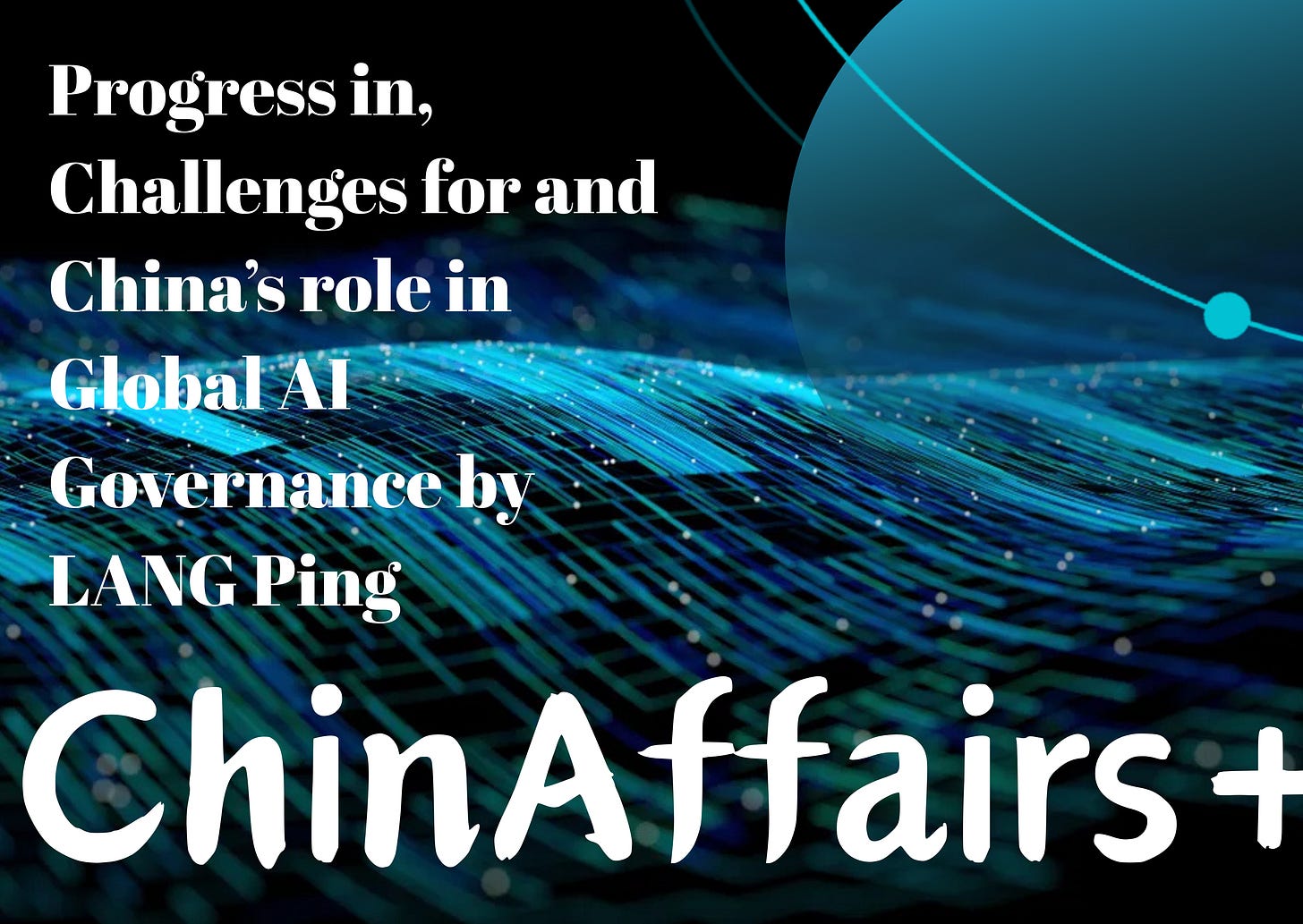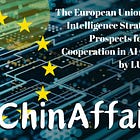Progress in, Challenges for and China’s role in Global AI Governance by LANG Ping
China is actively promoting AI governance by offering China’s solution, engaging in its development, empowering multilateral dialogues and making full use of the platform.
Welcome to the 52nd edition of our weekly newsletter! I'm SUN Chenghao, a fellow with the Center for International Security and Strategy (CISS) at Tsinghua University, Council Member of The Chinese Association of American Studies, a visiting scholar at Paul Tsai China Center of Yale Law School in 2024 and Munich Young Leader 2025.
ChinAffairsplus is a newsletter that shares articles by Chinese academics on topics such as China's foreign policy, China-U.S. relations, China-Europe relations, and more. This newsletter was co-founded by my research assistant, ZHANG Xueyu, and me.
Through carefully selected Chinese academic articles, we aim to provide you with key insights into the issues that China's academic and strategic communities are focused on. We will highlight why each article matters and the most important takeaways. Questions and feedback can be addressed to sch0625@gmail.com.
Today, we have selected an article written by LANG Ping, which focuses on Global AI Governance and China’s Role in This Domain.
Summary
In recent years, with continuous breakthroughs and innovations in generative AI, AI governance has rapidly become a heated topic within and among numerous intergovernmental organizations and multilateral platforms. As the most authoritative international organization with the most comprehensive representation, the UN has been actively leading the charge to develop a global AI governance process. Other intergovernmental organizations such as the G20, G7, and OECD have also been vigorously advancing agendas on AI governance. Uncertainties in national AI regulatory policies, intensifying strategic competition among major powers, and growing security risks from the militarization of AI have brought many challenges to global AI governance.
As a major AI power, China has been deeply engaged in and is actively guiding global AI governance, contributing Chinese wisdom and solutions to bridging the global intelligence gap, promoting international cooperation on AI, and advancing the building of a global AI governance framework.
Why It Matters
Since 2022, the widespread application of a new generation of AI, represented by ChatGPT, has elevated AI innovation to a new level. AI offers extraordinary potential for good. Yet, there are also risks. AI can exacerbate social biases, and politicians may use AI to manipulate public opinion across borders. AI can even be applied to design and strike targets in conflicts, potentially resulting in large-scale social disruption and human suffering. The speed, autonomy, and opacity of AI systems challenge traditional regulatory models. As a result, we need to conduct responsible assessments of AI within the context of its implementation.
In October 2023, the UN HLAB on AI (the Multi-stakeholder High-level Advisory Body on Artificial Intelligence) was formed to undertake analysis and advance recommendations for the international governance of AI. In November, the AI Safety Summit was held in the UK. Twenty-eight countries issued the Bletchley Declaration, calling for international cooperation to manage the challenges and risks of AI.
Ongoing regional and intergovernmental processes have increasingly emerged, such as those led by the EU, G7, G20, UNESCO, and the OECD. However, this trend has also highlighted a larger digital and developmental divide. These multilateral efforts have largely overlooked the inclusion of diverse stakeholders, especially those from the Global South. More inclusive engagement is needed so that all citizens can benefit from AI governance.
As a major AI power, China also actively engages in AI governance and promotes international cooperation. This study provides a macro-level view of progress made and persisting challenges in AI governance progress and analyzes the four main roles China could play on the world stage.
Key Points
A Brief History of Global AI Governance
Global society first started paying attention to AI governance in 2010, when UNESCO and the ITU started focusing on AI’s influence on education, culture, ethics, and telecommunication technologies. The year 2017 is usually viewed as marking the beginning of international AI governance, as it is the year when the AI for Global Good Summit was held. After the breakthrough of generative AI in 2022, the AI governance process accelerated. In May 2023, distinguished AI scientists signed a single-sentence statement, warning people about the risks of AI. Under these circumstances, AI governance was viewed as increasingly important among international organizations and multilateral platforms.
The UN’s Active Leadership in Progressing International AI Governance
António Guterres, Secretary-General of the United Nations, stated in 2023 that the UN is the ideal place for setting global standards and approaches, and he welcomed calls from member states to create a new UN entity to support collective efforts to govern this technology. The UN HLAB on AI was then established. Several documents and multilateral platforms were created to promote open, transparent, and inclusive discussion on AI governance. For instance, UNESCO’s AI Ethics Framework has been endorsed by over 50 countries.
The Active Advancement of AI-Related Agendas by Other International Organisations
In 2023, the G7 leaders launched the Hiroshima AI Process, calling for collaboration with the GPAI (Global Partnership on AI), the OECD, as well as developing countries and emerging economies. OECD member countries called for the establishment of an interoperable global governance framework through the revised Recommendation on Artificial Intelligence. The G20 placed AI issues within the framework of global governance reform and established an AI Task Force in 2025. The SCO (Shanghai Cooperation Organization) and the BRICS states also expressed their willingness to cooperate in managing AI risks and ensuring that AI benefits all of humanity.
New Efforts to Develop Global AI Safety Governance Launched by the International Community
Summits have been held to build consensus and establish effective mechanisms for AI governance, such as the first Global AI Safety Summit in the UK in 2023 and the AI Seoul Summit in 2024. More recently, the AI Action Summit was held in Paris in February 2025. In Paris, sixty countries and international organizations, with the exception of the US and the UK, signed the Declaration on Developing Inclusive and Sustainable AI for the Benefit of Humanity and the Planet.
Challenges Facing Global AI Governance
The Uncertainty of Achieving Consensus on International AI Governance
AI technology is developing rapidly, yet its large-scale societal applications have not truly begun to be implemented. Additionally, national AI regulatory policies are continuously being adjusted, which adds uncertainty to future cooperation on AI governance. For instance, the EU introduced the Artificial Intelligence Act in 2024, which is the world’s first comprehensive AI regulatory framework. At the AI Action Summit in 2025, the EU began to ease constraints on technological innovation by streamlining AI regulatory rules. The US has also opposed excessive regulation in the AI industry. Significant changes in national stances, particularly the trend toward relaxing regulations, will profoundly impact the development of AI governance.
Centrifugal Forces in Global AI Governance Emerging from Great Power Competition
AI plays a crucial role in reshaping the world order. How countries utilize and manage AI will determine their national strength. The US regards AI competition as a “high-stakes economic and geopolitical contest” and recently announced the launch of Stargate, an AI infrastructure initiative with a projected investment of USD 50 billion. China’s DeepSeek triggered a strong response from western countries, further concretizing great power geopolitical competition. The AI race among major powers is likely to trigger new geopolitical confrontations, deepening divisions and making international AI governance increasingly difficult.
The National Security Risks Posed by AI: a Double-edged Sword Shaping the Trajectory of Global AI Governance
On one hand, the prevention and mitigation of AI-related security risks a common challenge for all nations. On the other hand, the weaponization and militarization of AI are reshaping the nature of warfare, adding further uncertainty to the geopolitical landscape. The Ukraine crisis has already become a testing ground for AI applications and AI may in some respects pose an even greater challenge to national security than nuclear weapons. As a result, enhancing national competitiveness and deterrence capacity often becomes the priority, which in turn significantly weakens states’ willingness to engage constructively in global AI governance.
China’s Role in the Development of Global AI Governance
As the world’s second-largest economy and a major power in artificial intelligence, China has consistently played an active role in shaping and leading global AI governance, serving as both a strong advocate and a committed practitioner. At the third Belt and Road Forum for International Cooperation held in Beijing in 2023, President Xi Jinping announced the Global AI Governance Initiative (GAIGI), outlining the pathway for China’s active participation in AI governance.
Offering China’s Solution to Global AI Governance
China’s Global AI Governance Initiative elaborates China’s approach, which includes a people-centered vision, promoting AI for good, and enhancing AI’s safety, reliability, controllability, and fairness. It also supports the establishment of a global AI governance institution under the UN framework, stronger international cooperation, assistance for developing countries, bridging the digital divide, etc.
Actively Engaging In and Leading the Development of Global AI Governance
China supports the UN in playing a significant role in AI governance and actively promotes cooperation under the UN framework. In 2024, the 78th UN General Assembly reached a consensus by adopting a resolution spearheaded by China on enhancing international cooperation for AI capacity building. China also proposed the AI Capacity-Building Action Plan for Good and for All, including five visions and ten actions addressing the shared aspirations of the Global South.
Promoting International AI Dialogues and Empowering Bilateral and Regional Cooperation
In 2024, China and France released a joint declaration on artificial intelligence (AI) and global governance. Though the Digital Silk Road initiative, BRICS, Forum on China-Africa Cooperation and China–ASEAN cooperation mechanisms, AI has been incorporated into cooperation agendas.
Making Full Use of Global Governance Platforms to Play a Leading Role
In July 2024, the World AI Conference and High-Level Meeting on Global AI Governance issued the Shanghai Declaration on Global AI Governance, calling on all countries to uphold a people-centered approach and the principle of ‘AI for Good’, ensure safety, reliability, controllability, and fairness in the development of AI, promote AI technologies that empower human social progress, and put forward specific recommendations to advance international cooperation in AI. The 2024 Wuzhen Summit's “International Rules in Cyberspace: Practice and Exploration” sub-forum, resulted in the publication of the Global AI Governance Research Report, delving into the current status, issues, and system construction of global AI governance.
Conclusion
AI’s future trajectory remains highly uncertain. On one hand, the development prospects for AI technology are still unclear, and these are precisely what will largely determine the core question of what the content of global AI governance should be. On the other hand, during this transitional phase of reshaping the international order, escalating geopolitical conflicts and great power competition will determine how far global AI governance can advance.
China is actively promoting AI governance by offering China’s solution, engaging in its development, empowering multilateral dialogues and making full use of the platform. As long as the international community can engage in collaborative consultation and construction on the basis of equality and mutual respect, adhere to a people-centered and AI-for-good approach, and anchor certainty amid uncertainty, it can jointly promote the development of AI for the benefit of the world.
About the Author
LANG Ping 郎平: A Professor and Graduate Supervisor with the School of International Politics and Economics at University of Chinese Academy of Social Sciences, and Researcher with the Institute of World Economics and Politics at the Chinese Academy of Social Sciences.
About the Publication
The Chinese version of the article was published by the Contemporary World Journal Press《当代世界》, supervised by the International Department of the Central Committee of the Communist Party of China (IDCPC). The journal is a comprehensive bimonthly periodical distributed both in China and overseas. It brings together a wealth of views from renowned experts and think tanks around the world on international issues, and offers in-depth analysis of the contemporary world, dynamic changes to the international landscape, and China’s foreign policies and practices.










